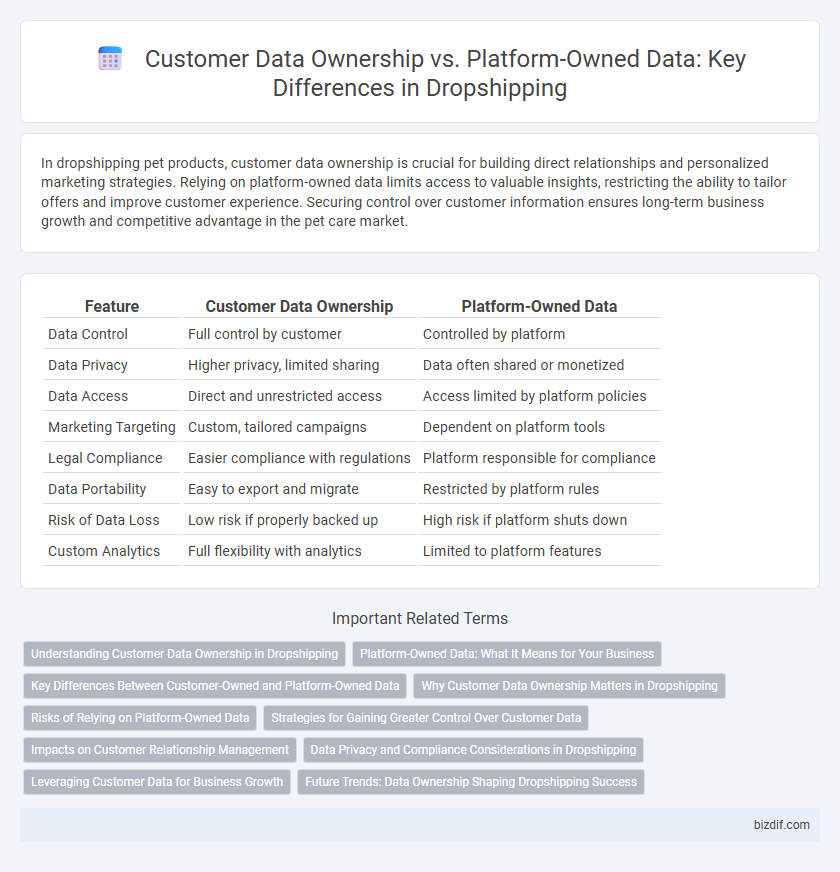In dropshipping pet products, customer data ownership is crucial for building direct relationships and personalized marketing strategies. Relying on platform-owned data limits access to valuable insights, restricting the ability to tailor offers and improve customer experience. Securing control over customer information ensures long-term business growth and competitive advantage in the pet care market.
Table of Comparison
| Feature | Customer Data Ownership | Platform-Owned Data |
|---|---|---|
| Data Control | Full control by customer | Controlled by platform |
| Data Privacy | Higher privacy, limited sharing | Data often shared or monetized |
| Data Access | Direct and unrestricted access | Access limited by platform policies |
| Marketing Targeting | Custom, tailored campaigns | Dependent on platform tools |
| Legal Compliance | Easier compliance with regulations | Platform responsible for compliance |
| Data Portability | Easy to export and migrate | Restricted by platform rules |
| Risk of Data Loss | Low risk if properly backed up | High risk if platform shuts down |
| Custom Analytics | Full flexibility with analytics | Limited to platform features |
Understanding Customer Data Ownership in Dropshipping
Customer data ownership in dropshipping refers to the control and rights a seller has over the information collected from their customers during transactions. Unlike platform-owned data, which is controlled and potentially used by the marketplace or dropshipping platform, customer data ownership enables merchants to leverage insights for targeted marketing, personalized experiences, and enhanced customer relationships. Understanding this distinction is critical for compliance with data privacy regulations like GDPR and CCPA, as well as for maintaining competitive advantage and trust in the dropshipping business model.
Platform-Owned Data: What It Means for Your Business
Platform-owned data in dropshipping means the e-commerce platform retains control over customer information, limiting a seller's direct access and ability to use this data for personalized marketing or customer relationship management. This restricts business growth opportunities as sellers cannot fully leverage customer insights to optimize campaigns or build brand loyalty. Understanding this dynamic is crucial for dropshippers to strategize effectively around customer acquisition and retention while complying with platform policies.
Key Differences Between Customer-Owned and Platform-Owned Data
Customer-owned data grants businesses full control over consumer information, enabling tailored marketing strategies and enhanced privacy compliance. Platform-owned data, typically held by e-commerce marketplaces or dropshipping platforms, limits access and usage rights, often restricting direct communication with customers. Key differences include data accessibility, control over customer relationships, and the ability to leverage insights for personalized customer experiences.
Why Customer Data Ownership Matters in Dropshipping
Customer data ownership is crucial in dropshipping because it enables business owners to retain full control over customer information, facilitating personalized marketing and improving customer retention. Platform-owned data limits access to valuable insights, restricting the ability to tailor offers or understand buying behavior effectively. Empowering dropshippers with customer data ownership drives long-term growth, enhances brand loyalty, and supports data-driven decision-making strategies essential for competitive advantage.
Risks of Relying on Platform-Owned Data
Relying on platform-owned customer data in dropshipping poses significant risks, including limited access to valuable insights and potential loss of control over customer relationships. Platforms may impose restrictions or change policies, jeopardizing data availability and undermining marketing strategies. Without proper ownership, dropshippers face challenges in building personalized experiences and sustaining long-term customer loyalty.
Strategies for Gaining Greater Control Over Customer Data
Implementing custom customer relationship management (CRM) systems enables dropshipping businesses to collect and analyze proprietary customer data independently from third-party platforms. Utilizing first-party data strategies, such as personalized email marketing and direct website interactions, enhances control over customer insights and purchasing behavior. Prioritizing data privacy compliance with regulations like GDPR and CCPA builds customer trust and solidifies data ownership in a competitive dropshipping landscape.
Impacts on Customer Relationship Management
Customer data ownership in dropshipping directly influences the effectiveness of customer relationship management (CRM) by enabling personalized marketing, accurate segmentation, and tailored communication strategies. When platforms retain ownership, dropshippers face limited access to critical customer insights, which restricts their ability to build loyalty and optimize customer lifetime value. Empowering dropshippers with data control fosters stronger customer engagement and enhances trust, ultimately driving repeat sales and business growth.
Data Privacy and Compliance Considerations in Dropshipping
In dropshipping, customer data ownership is critical for ensuring compliance with data privacy laws such as GDPR and CCPA, which mandate transparent data handling and user consent. Retailers often rely on platform-owned data, but maintaining control over customer information enables better compliance management and direct communication channels. Prioritizing secure data storage and clear privacy policies helps mitigate risks associated with data breaches and regulatory penalties.
Leveraging Customer Data for Business Growth
Dropshipping businesses maximize growth by owning and analyzing customer data rather than relying solely on platform-owned information. Direct access to detailed purchasing behavior, preferences, and contact details allows personalized marketing campaigns and improved product recommendations. This strategic use of customer data drives higher conversion rates, customer loyalty, and long-term revenue growth.
Future Trends: Data Ownership Shaping Dropshipping Success
Customer data ownership is becoming a critical factor in dropshipping success, as brands seek greater control over personalized marketing and customer relationship management. Emerging technologies like blockchain and decentralized databases enable transparent, secure data handling, shifting power from platforms to individual merchants. Future trends indicate that dropshipping businesses prioritizing direct data ownership will gain competitive advantages through enhanced customer insights and tailored user experiences.
Customer Data Ownership vs Platform-Owned Data Infographic

 bizdif.com
bizdif.com